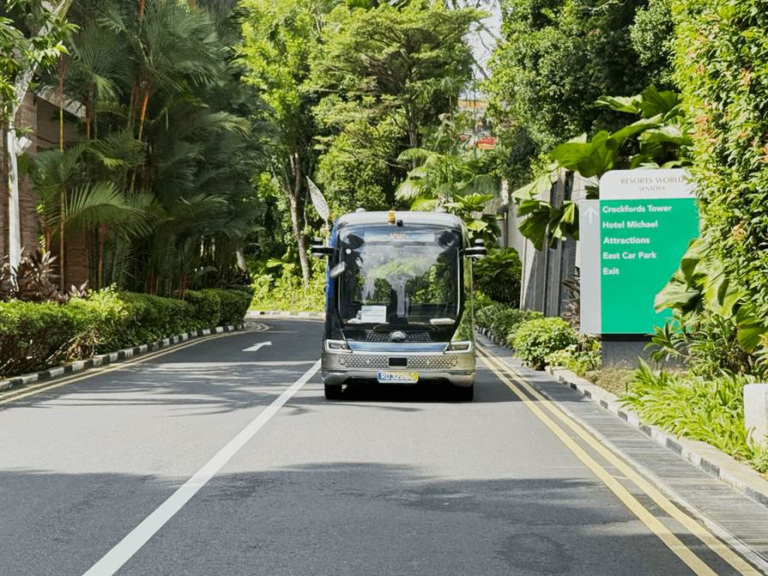WeRide has begun fully driverless Robobus operations at Resorts World Sentosa (RWS) in Singapore, without any safety officer on board, becoming the first to do so in Southeast Asia, according to the company. Following extensive testing and safety assessments of its remote operations and on-road performance, WeRide has secured approval from the Land Transport Authority of Singapore (LTA) to offer fully driverless rides to the public. This achievement comes after a year of safe service since June 2024, during which WeRide says the Robobus transported tens of thousands of passengers within RWS and completed thousands of autonomous trips.
“This launch marks a groundbreaking milestone for WeRide and the future of mobility in Southeast Asia,” said Jennifer Li, CFO and head of international at WeRide. “Deploying the region’s first fully driverless Robobus demonstrates that our vehicles are safe, reliable and ready to transform public transportation at scale. We value Singapore’s strong regulatory support and our close collaboration with local partners in making this launch possible, reflecting our global approach to working with progressive governments to bring autonomous driving technology into real-world operations.”
WeRide’s Robobus connects key points within RWS, including Equarius Hotel, Hotel Michael, Hotel Ora and The Galleria, on a fixed 12-minute loop. Before obtaining approval to offer fully driverless rides, it had been operating as Singapore’s first autonomous bus without a steering wheel and pedals on public roads, with a safety officer on board. Since launch, the Robobus has maintained a zero-incident safety record, according to the company, supported by an integrated setup of lidars, cameras and sensors capable of detecting obstacles over 200m away within 360°.

Last month, Acting Minister for Transport Jeffrey Siow announced plans to integrate AVs into the national public transportation network by the end of 2025, with fully driverless solutions like WeRide’s Robobus expected to deliver strong mobility value. Aligned with this national vision, WeRide has also established a dedicated R&D center in Singapore, with support from the Singapore Economic Development Board (EDB), to advance AV innovation and deployment capabilities.
“AV technology is an exciting development that has the potential to shape the future of mobility. WeRide is an example of how AV companies can partner with Singapore to undertake AV trials and R&D, and create new jobs such as software development engineers, machine learning engineers and data scientists. We continue to welcome interest from companies to partner with us in driving AV innovation,” said Cindy Koh, executive VP at the EDB.
“LTA has been working with WeRide to facilitate autonomous shuttle trials at Resorts World Sentosa,” added Lam Wee Shann, deputy chief executive (technology) and CTO at LTA. “As part of LTA’s AV assessment framework to ensure the safety and reliability of AV operations, all companies intending to deploy AVs must first pass relevant assessments related to their autonomous capabilities and demonstrate their ability to operate safely on public roads with safety operators on board without any incident. Once they pass the assessments, they may proceed to remove the onboard safety operator requirement and replace it with constant remote monitoring instead. LTA will continue to work closely with companies that seek to deploy AVs to alleviate manpower constraints, increase productivity and enhance transport connectivity.”
WeRide has extensive operations and achieved several industry-first milestones in Singapore across multiple AV categories. In November 2024, the company deployed its Robosweeper S6 and S1 at Marina Coastal Drive and the Esplanade as Singapore’s first commercialized autonomous sanitation project – just a week after securing M1 and T1 licenses from LTA. In March 2025, WeRide began trial operations of its Robosweeper S1 in Jurong Lake Gardens, marking its first deployment in Singapore’s heartlands. Moving forward, the operator says it will seek to strengthen collaborations with LTA and various stakeholders across the region to introduce more validated products and scalable business models across Singapore and Southeast Asia.
In related news, Beep has begun operating the Jacksonville Transportation Authority’s autonomous vehicle service NAVI (Neighborhood Autonomous Vehicle Innovation), which it states is the USA’s first fully autonomous public transportation system.


